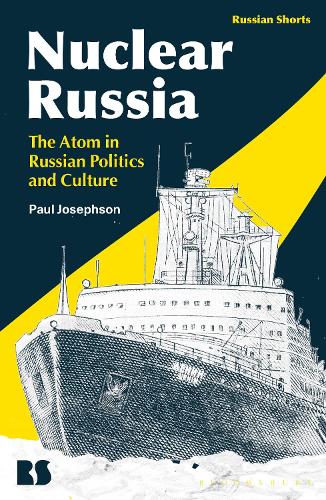
Nuclear Russia: The Atom in Russian Politics and Culture
(Paperback)
Available Formats
Publishing Details
Nuclear Russia: The Atom in Russian Politics and Culture
By (Author) Professor Paul Josephson
Bloomsbury Publishing PLC
Bloomsbury Academic
9th March 2023
United Kingdom
Classifications
Tertiary Education
Non Fiction
History of science
History of engineering and technology
355.02170947
Physical Properties
Paperback
160
Width 128mm, Height 196mm, Spine 14mm
180g
Description
In the first cultural and political history of the Russian nuclear age, Paul Josephson describes the rise of nuclear physics in the USSR, the enthusiastic pursuit of military and peaceful nuclear programs through the Chernobyl disaster and the collapse of the Soviet Union, and the ongoing, self-proclaimed renaissance of nuclear power in Russia in the 21st century. At the height of their power, the Soviets commanded 39,000 nuclear warheads, yet claimed to be servants of the peaceful atom which they also pursued avidly. This book examines both military and peaceful Soviet and post-Soviet nuclear programs for the long dure before the war, during the Cold War, and in Russia to the present whilst also grappling with the political and ideological importance of nuclear technologies, the associated economic goals, the social and environmental costs, and the cultural embrace of nuclear power. Nuclear Russia probes the juncture of history of science and technology, political and cultural history, and environmental history. It considers the atom in Russian society as a reflection of Leninist technological utopianism, Cold War imperatives, scientific hubris, public acceptance, and a state desire to conquer nature. Furthermore the book examines the vital and perhaps unexpected significance of ethnicity and gender in nuclear history by looking at how Kazakhs and Nenets lost their homelands and their health in Russia in the wake of nuclear testing, as well as the surprising sexualization of the taming of the female atom in the Russian Miss Atom contests that commenced in the 21st century.
Reviews
The nuclear complex of Russia has not come to an end, to the contrary: its military and civilian arms continue to expand threating both the global political order and the environment. Nuclear Russia unfolds the entangled history of this socio-technical complex from the February Revolution of 1917 to the present, its knowledge and engineering orders, nuclear warheads and military facilities, actors and reactors, and above all its political, economic, environmental and cultural ramifications. This most timely book is a great pleasure to read. * Helmuth Trischler, Prof. Dr., Rachel Carson Center and Deutsches Museum, Munich, Germany *
One can hardly imagine a better guide to Russian nuclear power than Paul R. Josephson. Attention to Ukraine is particularly welcome in the wake of Russias devastating invasion and attendant risk of nuclear disaster. * Matthew Evangelista, President White Professor of History and Political Science, Cornell University, USA *
Author Bio
Paul R. Josephson is Professor of History at Colby College, USA. He is the author of twelve books, including Traffic (Bloomsbury, 2017), Fish Sticks, Sports Bras, and Aluminum Cans (2015), The Conquest of the Russian Arctic (2014), Lenins Laureate: A Life in Communist Science (2010), Would Trotsky Wear a Bluetooth Technological Utopianism Under Socialism (2009), and Motorized Obsession: Life, Liberty and the Small Bore Engine (2007).
